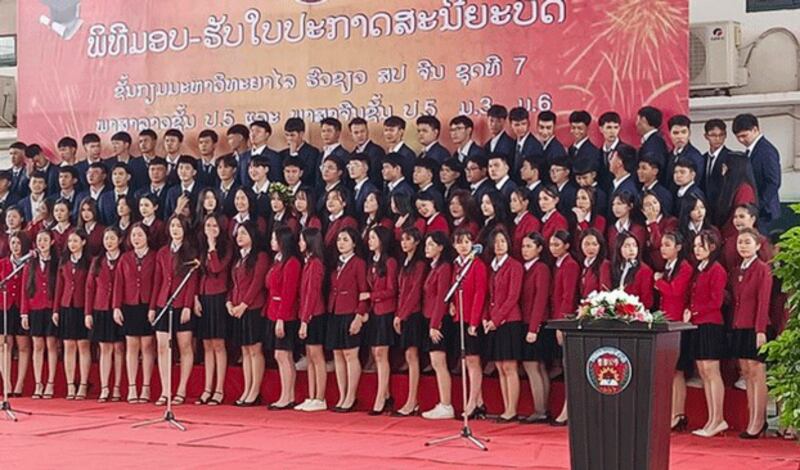[ Read RFA coverage of this topic in Lao. Opens in new window ]
Young people in Laos are increasingly enrolling in classes to learn Mandarin – and shunning university – as the number of Chinese tourists and Chinese-funded investment projects grow, according to data and accounts from schools, students and parents.
Many young people see learning Chinese, and not a university degree, as a way to earn money in a country going through an economic crunch with soaring inflation and a weakening currency that have driven many to neighboring Thailand for jobs.
The Chinese language learning boom started a few years agoas Beijing ratcheted up investment in the poor, landlocked Southeast Asian country, building dams, roads and power plants.
Last year, Chinese companies invested in 17 projects worth US$986 million in Laos, positioning China to soon become its top trading partner, replacing neighboring Thailand, the Ministry of Planning and Investment said in February.

Many are taking Mandarin classes at Confucius Institutes, which have come under fire in the United States and elsewhere for being linked to the Chinese Communist Party’s influence operations.
The Confucius Institute at Souphanouvong University in Luang Prabang is full, said a school registrar, who like other sources in this report requested anonymity so as to speak freely.
“We see more Chinese tourists, and more local people here learning Chinese,” the registrar said.
A resident who sent her daughter to a Chinese language school in Luang Prabang echoed the popularity of the language.
“There are many other Lao private schools that teach Chinese because the Chinese market is expanding,” she said. “More Chinese tourists and businesses are coming to the town and to the country.”
University enrollment drops
Meanwhile, the National University of Laos in Vientiane reported that only 5,457 students took its entrance exam even though there were nearly 7,700 openings available, according to Lao Socio-Economic News.
Only 329 students sat for this year’s entrance exam at Savannakhet University in southern Laos on Aug. 20, though the school planned to admit 1,500 new students.
RELATED STORIES
[ Laos’ top university to offer master’s degree in Chinese language teachingOpens in new window ]
[ Laos’ high school graduates flocking to Chinese studies in universityOpens in new window ]
[ Chinese investment in Laos sparks Chinese-language learning boomOpens in new window ]
And even in universities, Chinese is becoming the most popular subject, including at the National University of Laos, a professor who works there said.
Among prospective students, almost one-fifth, or 1,063, chose to study Chinese, while 723 students selected English, according to Lao Socio-Economic News.
“Chinese is the most popular subject at schools, [and] even adults are learning Chinese,” the professor said.

“There is more Chinese investment in our country; therefore, more and more people are learning Chinese,” he said. “They hope that the Chinese will help them get better jobs and earnings.”
Education enrollment in general is declining amid the economic slump.
RFA reported in June that middle and high school students said they were quitting school because of the country's dismal economy and lack of job opportunities.
The number of graduates from these schools fell for the last three years, as high inflation raised the costs of food and transportation, making it hard for families to pay for school supplies and uniforms.
Lao Tourism Year
The number of Chinese tourists rose after Laos designated 2024 as Lao Tourism Year to create jobs and generate foreign currency revenue amid an economic downturn and following three years of closure due to the COVID-19 pandemic.
“That’s why many more Laotians are interested in learning Chinese,” said a Luang Prabang tour guide who asked not to be identified. “Those who speak Chinese not only can work as tour guides but also can work at hotels and with Chinese businesses.”
“In other words, people with Chinese speaking skills have better opportunities to get better jobs and wages,” he said.
A private school teacher in Luang Namtha province in northern Laos told Radio Free Asia that for the upcoming academic year, his school will offer extra Chinese courses and after-school classes.
A principal of a private school in Luang Prabang province said his school needs many Chinese teachers from China, not Lao teachers who can teach Chinese.
A high school graduate in Xieng Khouang province said she now regrets not having taken the university entrance exam.
“I decided to help my parents work in our rice farm instead,” she said, calling it a hard decision. “If I go to university and when I graduate, I’m sure I’ll have a hard time finding work.”
Translated by Max Avary for RFA Lao. Edited by Roseanne Gerin and Malcolm Foster.
